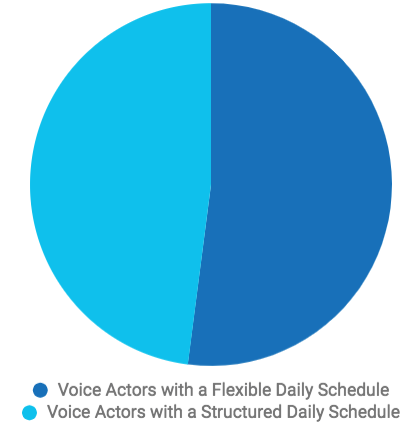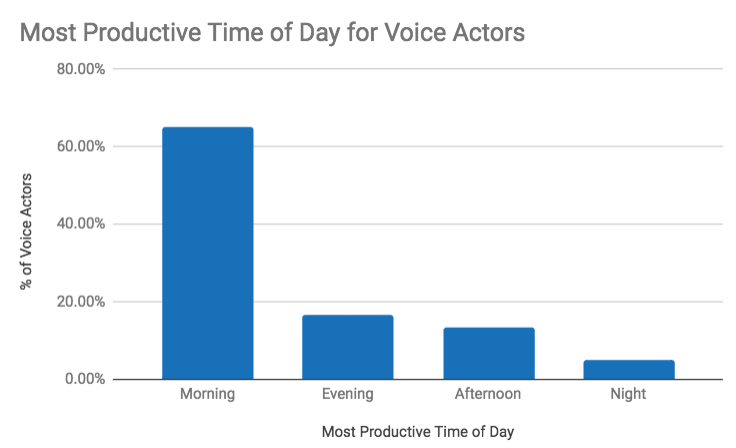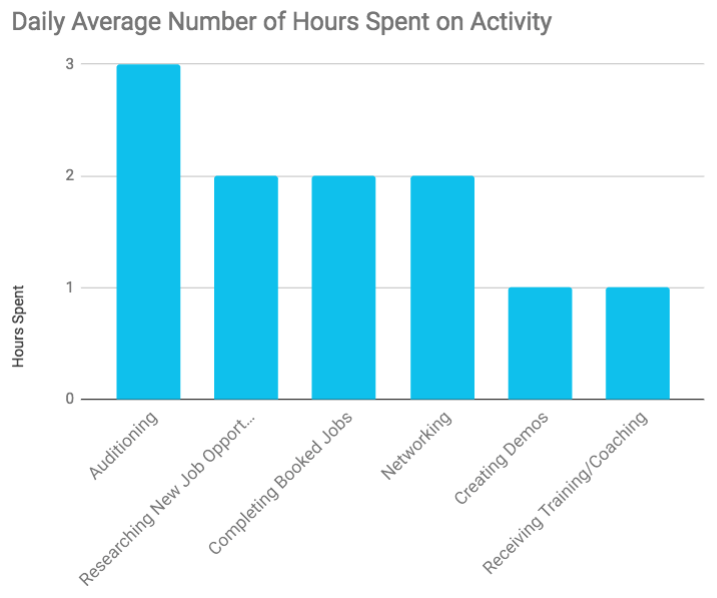The key to success in any industry, including voice acting, is being motivated and productive in how you manage your time. Sometimes referred to as ‘the hustle,’ it’s the tried and true way to reach your full potential.
We surveyed over 100 voice talent to gather insight into how they manage their day-to-day schedules to find success in the voice over business.
In this article
- How Many Hours a Day Should a Voice Actor Work?
- What Time of Day are Voice Actors Most Productive?
- How do Voice Actors Structure Their Work Days?

- Why a Structured Day Works for Some Voice Actors
- Why a Flexible Day Works for Some Voice Actors
- How Much Time do Voice Actors Spend on Auditioning, Making Demos, and Other Tasks?
- How Do Voice Actors Stay Motivated
- What Does Self Care Look Like for Voice Actors?
- A Day in the Life of a Voice Actor
From the results, you’ll get a sense of how to best tackle the hustle required to make a splash in the voice over industry.
You’ll find answers to questions like:
- How can voice actors improve time management?
- How many hours a day should a voice actor work?
- What time of day are voice actors most productive?
- How do voice actors structure their work days?
- How much time do voice actors spend on auditioning, making demos, and other tasks?
- How do voice actors stay motivated?
- What does self care look like for voice actors?
How Many Hours a Day Should a Voice Actor Work?
There certainly is such thing as working too much. And furthermore, there’s a threshold that everyone reaches where the additional work and effort no longer translate into additional success!
The voice actor productivity survey reported that voice actors are doing a great job of protecting themselves from the temptation of working too much.
Nearly half of our respondents work 7 hours a day or less. This is the perfect amount of time spent working, according to voice over coach Susan Berkley. She explained that ideally, “the rule of thumb is 4 hours a day and that’s with a 10 minute break every 50 minutes.”
What Time of Day are Voice Actors Most Productive?

40% of respondents reported being most productive in the morning. Many stating that in the morning, they have the most energy and the least amount of distractions compared to the rest of the day.
If you find that mornings work well for you too, be sure to take enough time to properly warm up your voice. Susan Berkley recommends starting warm ups in your morning shower:
Using the time in the shower is excellent. Because of the warm moist air you can – and should – be doing lip flutters.
How do Voice Actors Structure Their Work Days?
Based entirely on personal preference, either a highly-structured or flexible day can increase a voice actor’s productivity. From the survey, there was nearly a 50/50 split of voice actors who work by a structured day and voice actors who prefer to use everyday differently.

Why a Structured Day Works for Some Voice Actors
The general sentiment gathered from those voice actors who prefer a more structured day is that it provides a methodical approach to the day, allowing for more organization and making the hustle that much easier.
Why a Flexible Day Works for Some Voice Actors
On the other hand, because the demands and priorities of each day can vary so much, some voice actors said that to try and structure their day tends to make things more stressful. Those voice actors work better responding to the day’s needs as they come up.
There is no right answer when it comes to choosing your daily time management strategy. Experiment with outlining an activity structure and see if a routine and schedule feels right for you.
How Much Time do Voice Actors Spend on Auditioning, Making Demos, and Other Tasks?
The following graph shows the time allotment that voice actors reported for a series of activities:

As you can see, voice actors are often dedicating the most time to auditioning for new jobs. Even seasoned voice actors require new gigs to continue to grow their business. Auditioning is a tried and true method to get your voice heard by potential clients.
What better way to make a winning audition than to hear what clients want, directly from them! Producers Charlie Marks and Megan Antilla shared their opinion on the mistakes voice actors can make when submitting auditions:
For more advice straight from the producers, check out the rest of the short videos in our Learn What Clients Want post.
How Do Voice Actors Stay Motivated
Working from home and making your own schedule is a definite upside to being a voice actor. Yet, we can get so comfortable at home that we risk losing our focus and becoming less productive. So staying motivated is a skill voice actors especially need to master.
Motivation looks different to everyone. For some, using the structured work day and adhering to a set schedule helps to keep them motivated. Like voice actor Ed Bretten:
Motivation is a massive factor when you work by yourself / from home. That’s why I aim to follow typical working hours and a pattern of work. I’m also a big believer in taking proper breaks for lunch / dog walk so you can return to the studio in the afternoon feeling refreshed and ready to go again!
Others find that the center of their daily motivation is physical activity. When the stress levels in the recording studio start to feel too high, it can be very helpful to step out and find a way to shake it off. Like voice actor Emily Mattheson does:
Exercise really helps me get out some of that stressful energy of ‘will I get this or that job’, etc. I also like to stop if I’m approaching burnout, and take a walk and get a coffee or something, just to remember there is a world outside my little studio!
Voice actors often reported finding motivation in their peers. Online videos, social media groups, and voice over blogs, much like this one, help to keep voice actors motivated when they need to step away from the studio but want to stay in the headspace of voice acting. Voice actor Tyler Boss does this:
I’m a subscriber to a few different YouTube channels of guys in the business. They keep me motivated and up to date on things happening in the world of voice over.
Lastly, there are the voice actors who are putting the pedal to the metal, motivated or not. They’re riding the discipline wave to help them get through the day of auditioning, making demos, completing jobs, etc. If it works, it works! Voice actor Duffy Weber adheres to this grind, which helps him maintain more of a free flowing day as well:
Motivation is nice, but discipline is better. You have to work consistently even when you’re not motivated or inspired to do so.
What Does Self Care Look Like for Voice Actors?
Though working from home and making your own schedule can be a dreamy lifestyle, it has been said that there are elements of loneliness and isolation that come with the job of sitting in a recording studio alone for extended periods of time.
Taking care of ourselves encompasses all aspects of the mind and body. Sometimes self-care means caring for the physical self by getting enough exercise and eating healthy. Genevieve Hannon really puts this into practice:
[My self-care practices consist of] Drinking lots of water throughout the day, occasionally with an electrolyte powder in it. Stretching, standing up in my vocal booth often, hiking with my dogs, eating healthy meals, doing vocal warm ups and breathing exercises, meditating and doing yoga, [and] not consuming anything dehydrating.
Many voice actors, like Bryan Olsen and Benjamin Shuman, put the self-care emphasis on taking the mental breaks necessary to keep from burning out in the studio. Understanding that a work/life balance is the true success metric to live by helps them keep the stresses of voice over work in perspective:
Bryan Olson:
I try and take breaks often and do my best to enjoy the things around me like my family. Work is important but life is more important than working all the time.
Benjamin Shuman:
I limit my work hours to a fixed schedule (apart from special circumstances). I’ve found that working a ton does not increase my productivity significantly, so I make the hours I do work count, and relax the rest of the time.
If you feel like you could use more downtime in your day but can’t seem to find the time, our article on the importance of downtime is full of tips to help you carve out that much needed time for self-care and work/life balance.
A Day in the Life of a Voice Actor
From working short or long hours, to working in the morning or evening, or having a scheduled or flexible day, what it means to experience a day in the life of a voice actor is to experience the freedom of working from home and the gratification of having a super cool career lending your voice to real world applications.
If you’re new to the industry and want more information on how to kick-start your voice acting career, check out our getting started in voice acting guide. It covers everything from coaching, to demo production, to home studio equipment and software, and more!
Ready to start finding voice over jobs to audition for? Sign up for a free Voices account today.

Leave a Reply